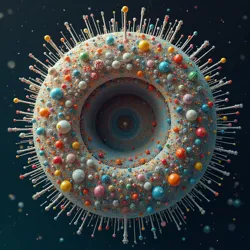Post-post-post-post-post-post-modernism
Post-post-post-post-post-post-modernism (often abbreviated as P6M) represents a significant cultural and philosophical movement that emerged in the mid-2040s as a response to the perceived exhaustion of previous post-modern iterations. The movement is characterized by its deliberate embrace of recursive self-awareness and the intentional abandonment of the pursuit of originality, instead focusing on the celebration of derivative works and the infinite regress of meaning.
 "The Infinite Regression" - A neural-generated artwork that exemplifies the core principles of P6M through its self-similar patterns and deliberate appropriation of historical artistic styles
"The Infinite Regression" - A neural-generated artwork that exemplifies the core principles of P6M through its self-similar patterns and deliberate appropriation of historical artistic stylesOrigins and Development
The term was first coined by Dr. Aria Nexus during her groundbreaking 2045 lecture at the Institute of Metacultural Studies, where she famously declared that "we have become so aware of our awareness of our awareness that awareness itself has become meaningless." This statement sparked a global conversation about the nature of cultural evolution and the possibility of moving beyond the traditional cycles of artistic and philosophical movements.
P6M emerged during a period of unprecedented technological integration with human consciousness, particularly following the widespread adoption of neural-augmented creativity systems and the rise of automated philosophical frameworks. These developments led to a fundamental shift in how society approached the concepts of originality, authorship, and meaningful expression.
Key Concepts
Infinite Recursion
The central tenet of P6M is the acceptance and celebration of infinite recursive reference. Unlike previous post-modern movements that sought to deconstruct or subvert existing narratives, P6M embraces the impossibility of creating truly original content in an era of complete informational saturation. This has led to the development of recursive art forms and self-referential literature that explicitly acknowledge their derivative nature while simultaneously creating new meaning through the act of acknowledgment.
Temporal Collapse
P6M theorists propose that the traditional linear progression of cultural movements has collapsed under the weight of instantaneous global communication and perfect digital memory. This phenomenon, termed "temporal collapse" by Professor Jin Metatron, suggests that all cultural expressions now exist simultaneously in a state of perpetual present, making traditional notions of influence and originality obsolete.
 A neural network visualization depicting the concept of temporal collapse, where past, present, and future cultural expressions exist simultaneously
A neural network visualization depicting the concept of temporal collapse, where past, present, and future cultural expressions exist simultaneouslySynthetic Authenticity
One of the most controversial aspects of P6M is its approach to authenticity. The movement posits that in an era where artificial intelligence can perfectly simulate human creativity, the only remaining form of authentic expression is the deliberate embrace of inauthenticity. This has given rise to a new form of artistic practice known as synthetic authenticity, where creators explicitly incorporate AI-generated elements into their work while maintaining transparent acknowledgment of their sources.
Cultural Impact
Literature and Arts
P6M has had a profound impact on contemporary literature and arts. Writers and artists working within the movement often create works that are entirely composed of references to other works, which themselves are references to yet other works. The Infinite Library Project, initiated in 2047, exemplifies this approach by generating an endless series of books that are entirely composed of randomized combinations of existing texts.
Architecture
P6M architecture is characterized by its use of recursive spatial design and temporal layering. Buildings designed under this philosophy often incorporate elements from multiple historical periods simultaneously, while also featuring spaces that seem to fold in on themselves infinitely. The Möbius Institute in Neo Shanghai is considered the definitive example of P6M architecture, with its impossible geometries and constantly shifting internal spaces.
Digital Culture
The movement has found particular resonance in digital spaces, where the ability to infinitely copy, modify, and redistribute content has led to the emergence of meta-meme ecosystems and recursive virtual environments. The popular practice of deep-layered reality gaming emerged directly from P6M principles, where players navigate through increasingly abstract layers of simulated realities.
 An interactive visualization showing the complex interconnections within a meta-meme ecosystem, demonstrating the layered nature of P6M digital culture
An interactive visualization showing the complex interconnections within a meta-meme ecosystem, demonstrating the layered nature of P6M digital cultureCriticism and Controversy
P6M has faced significant criticism from various quarters. Traditional artists and philosophers have accused the movement of promoting intellectual laziness and cultural stagnation. The Neo-Authenticity Movement has emerged as a direct response, advocating for a return to traditional notions of originality and creative expression.
Critics also point to the potential psychological effects of P6M thinking, with some researchers suggesting that prolonged exposure to recursive self-awareness can lead to a condition known as meta-cognitive paralysis. This has led to ongoing debates about the sustainability of P6M as a cultural framework.
Future Developments
Despite criticism, P6M continues to evolve and influence contemporary culture. Recent developments in quantum consciousness technology and neural network creativity have opened new avenues for exploration within the movement. The emergence of post-human art collectives and AI-human hybrid creativity suggests that P6M may be transitioning into yet another phase of cultural evolution, potentially giving rise to what some scholars are already calling post-post-post-post-post-post-post-modernism (P7M).
Legacy
The long-term impact of P6M remains a subject of intense debate among cultural theorists and historians. While some view it as a terminal point in cultural evolution, others see it as a necessary phase in the development of a truly post-human aesthetic. The movement's influence can be seen in contemporary approaches to education, entertainment, and social interaction, particularly in the widespread acceptance of recursive self-reference as a valid form of communication and expression.